Shevlin Sebastian's Blog, page 91
April 28, 2016
An Unparallelled Talent
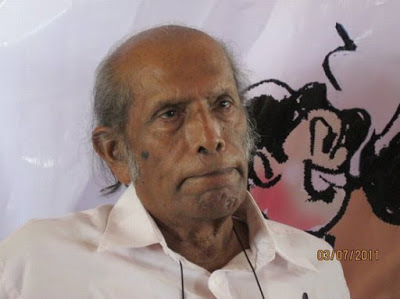 The great Malayali cartoonist Toms passed away on April 27, at the age of 87. I had the opportunity to meet him at his home in Kottayam a few years ago to hear his life story
The great Malayali cartoonist Toms passed away on April 27, at the age of 87. I had the opportunity to meet him at his home in Kottayam a few years ago to hear his life storyBy Shevlin Sebastian
A huge loss of crop his family in Kuttanad suffered in the monsoon deluge that year was what brought young Toms to the nearest coastal town: Alappuzha. There, the affected farmers were being given compensation, and writer N P Chellapan Nair was the special officer on duty. But Nair had yet to arrive.
Toms noticed some people waiting under a tree. This included one of Tom’s former classmates, Eashwara Pillai. “He knew I had sent cartoons to newspapers and got rejected. Just to pull my leg, he asked me ‘What’s happened to all your drawings?’”
Tom replied that talent apart, one had to have godfathers in newspaper offices. “Only then can our creations appear in print. I’m just incapable of mollycoddling them.”
Standing under a nearby tree was a thin man holding an umbrella. “After a while, he came up to me and said, ‘I heard you abusing newspaper people. You write poetry?’”
“No, I do cartoons…very good ones,” said Toms. “But nobody gives me the chance.”
The man said, “I will give you an address and you can send the cartoons there.”
Then he took out a pen and wrote, ‘Varghese Kalathil, Editor, Malayala Manorama, Kottayam.’ At which, Toms said, “Who are you to tell me this?”
In a low voice, the man said, “You can call me Varghese Kalathil.” He was himself the editor of the Manorama Weekly, and had come to Alappuzha to collect an article from Chellapan Nair.
That was how Toms’ cartoon got into the weekly. Soon he was given a regular column. For the next 30 years he contributed to the Malayala Manorama weekly; in 1961, he had become a staffer. And his cartoons revolved around the antics of Boban and Molly.
The ten-year-old twins in the cartoon, in fact, lived near Tom’s house and would go through his garden because it was a shortcut. One day, he befriended them. Inside Tom’s room, they saw a lot of drawings lying around. The twins became regulars at his place, and one day Molly said, “Can you draw me?”
Tom told her to sit down, and did a sketch. “She liked it a lot… Later her classmates appreciated it too.”
This made Boban jealous. Now, he too asked Tom to do a drawing of his. “I did it,” Toms says. “Thereafter, instead of drawing animals, I started drawing the faces of these two and their little antics.”
This strip, ‘Bobanum Molliyum’, became immensely popular and captured the imagination of Malayalis everywhere. “Manorama made me what I am,” he says.
When he retired in 1987, Toms brought out a book on Boban and Molly. The veteran cartoonist then started Toms Publications which continues to bring out Bobanum Molliyum (circulation: 1.5 lakh), Unni Kuttan, Mandoos and Tom’s Chitra Katha.
Asked the secret of his long career, Tom said, “Hard work and passion for the job. I also do a lot of reading and travelling.”
(Sunday Magazine, The New Indian Express, South India)
Published on April 28, 2016 07:13
April 26, 2016
A Conversation With An Upcoming Bollywood Star

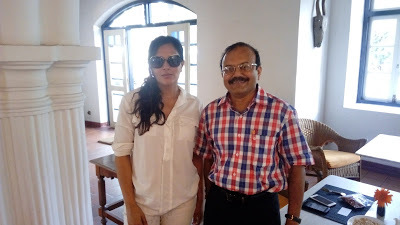 By Shevlin Sebastian
By Shevlin SebastianWhen I go to see the Bollywood actress, Richa Chadda, at a hotel in Fort Kochi, she is stunned when I tell her that I had not seen her breakout role in 'Gangs of Wasseypur – Part 1'.
“It ran for six weeks in Kochi,” she says, in an accusing tone.
“I am sorry, I wanted to see it, but somehow missed it,” I say.
Richa is shocked that I did not know that 'Masaan', in which she played a starring role, had won a national award recently.
“You don't follow Bollywood much, do you?” she says. “And you don't know anything about me.”
“I am sorry I am a last-minute replacement,” I say. “A colleague was not free to come. I just could not get the time to Google you.”
When she says that former cricketer S. Sreesanth is acting in the film, I say, “Really.”
“You don't even know that,” she says.
When she informs that the producer is Pooja Bhatt, I say, “You mean, Mahesh Bhatt's daughter.”
She nods and says, “Yes, the same.”
I say, “Gosh, I didn't know that.”
She looks at my notebook and the scrawly style, and says, “Nice handwriting. There is a gap between words. You don't see that nowadays.”
I had no option but to laugh and say, “Thanks for being polite.”
Then she watches me pour too much milk in the tea that it becomes white.
“You like milk, don't you?” she says.
She offers me cashew nuts.
I couldn't help thinking, as I take some, 'Nuts for a nut'.
Then I call her Rani, and Richa says, “You don't even know my name.”
Profuse apologies later, I ask about marriage, blundering, like TV journalist Bhupendra Chaubey in his interview with former porn star Sunny Leone.
“Aren't you being sexist?” she says. “Would you ask the same question to a male unmarried actor, of the same age [27]?”
My mouth opens. Hot air comes out.
“It's hot,” I say.
“Why is that?” she says.
“Global warming,” I say.
“I am so glad you said that,” says Richa. “People are in denial about climate change.”
Suddenly, the hero of the film, Gulshan Devaiah, arrives, with a group of people, and says, “Richa, tonight, dinner is on a boat.”
“Oh great,” says Richa. “I am loving this place.”
Talk shifts to director Anurag Kashyap who selected her for 'Gangs'.
“Anurag is my mentor,” says Richa. “He gave me such a strong role.”
“There were rumours he ran away to France after his last film ['Bombay Velvet'] flopped,” I say.
“Nobody runs away when their films flop,” says Richa. “He stays ten minutes from my house [in Mumbai]. I see him often.”
“So why did the news report come out?” I say.
“I guess not all journalists are intelligent (a significant pause) ..... like you,” she says.
Published on April 26, 2016 06:17
April 25, 2016
An Eye-Catching Design

 The American architectural firm, CetraRuddy, led by co-founder John Cetra, wins the Architizer Awards for the Choice School at Tiruvalla, Kerala
The American architectural firm, CetraRuddy, led by co-founder John Cetra, wins the Architizer Awards for the Choice School at Tiruvalla, KeralaBy Shevlin Sebastian
As 7 p.m. approached, on April 12, Elsa Jose, a trustee of the Choice Foundation, at Kochi, could feel her heartbeat speed up. The results of the Architizer Awards, which celebrates the year’s best architecture globally, was about to be announced in New York.
The design of the new Choice School, at Tiruvalla [88 kms from Kochi], by the American architectural firm Cetra Ruddy, led by co-founder John Cetra, 62, was in the Global Top 5 in the ‘Unbuilt Institutions’ Category.
Around 350 judges had selected the five finalists in each of the 115 categories. Thereafter, they would select a jury winner in each category. Meanwhile, the names of the finalists had been released to the public so that they can vote online. And it was in this public-voting category that Elsa hoped there would be good news.
So, she logged on, but the site had crashed due to too many visitors. A few minutes later, Elsa managed to break through. “I kept scrolling down and suddenly I saw that the Choice School, Tiruvalla, had been declared the winner,” says Elsa. “I yelled and jumped with joy and immediately called up my dad [Jose Thomas, President, Choice Foundation, who was in America], and informed my family and colleagues.” The school had defeated competitors from the USA, Russia, and Tanzania.
Says an elated Jose: “To me this is not just our achievement, but a major success for our country. All Indians should be proud.”
It is, is, indeed, something to be proud of. The school, which has an area of 2 lakh sq. ft., has five interconnecting blocks: a hostel, a performing arts centre, a primary, middle and high school. “The design resembles '5 fingers', which crisscross and reach out in different directions,” says John, who took a year to come up with the design, following multiple visits.
One major change is that in the junior classes, the familiar hall-type classrooms, with benches, one behind the other, has been changed. Instead, in each class, there will be eight to ten tables and chairs, where students will sit together. “I feel that students need to interact with each other in a more direct way,” says John. “Thus, they will be able to learn social skills, share ideas, and learn from each other, apart from the teacher’s contribution.” One important attribute is the way the school has been protected from the relentless monsoon rain. “We have provided a covered area outside the building, where the children can play or do other activities,” says John. “Thus, the environment becomes, not only one of interior classroom space but also an outdoor space and there is a connection between the two.” Another aspect which John has tackled is the harsh summer sunlight. So, he came up with the idea of creating a trellis-like woodwork outside the building which would help reduce the glare. “It becomes a great decorative element in the design of the building,” says John. “We have large windows in the classrooms, but these are protected on the outside by the decorative screenings. It will reduce the direct sun coming into the building.” The other materials he has used include reinforced concrete and perforated aluminium cladding.
In his research, John discovered that fans in classrooms in India made a lot of noise. He wondered how the children could hear the teacher. In some schools, the fans were installed under the light fixtures. This created a strobe-like effect. “To counter that, I have got rid of the fans and provided air conditioning,” says John. “So, it will be a pleasant experience for the children.”
And many people are happy, including superstar Mohanlal. “As a lover of art and design, the style closely reflects what Kerala truly is, while integrating modern amenities and using sustainable resources,” says Mohanlal. Incidentally, the first phase, from Classes 1-5, of the Rs 80 crore day-cum-boarding school, will be inaugurated in June.
Meanwhile, when asked how he selected CetraRuddy, which was recently inducted into the architectural Hall of Fame, Jose says, “Normally it would not have happened because their standard fees would not have made it viable for a school project in India [John was paid $500,000]. However, because of my close friendship with John, I told him that he should do something to radically alter the face of education in India.”
And this is what John has done.
Published on April 25, 2016 21:35
April 24, 2016
In Praise of God
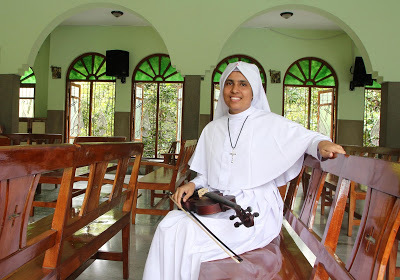
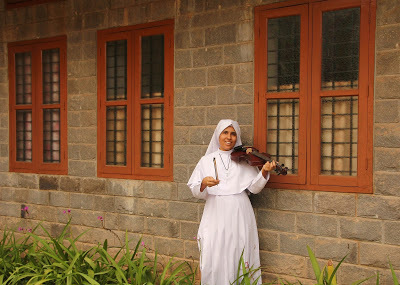 Sr. Rincy Alphonse is a trained Carnatic singer who sings songs, based on ragas, in honour of God, Jesus Christ and Mother Mary
Sr. Rincy Alphonse is a trained Carnatic singer who sings songs, based on ragas, in honour of God, Jesus Christ and Mother MaryPhotos by Albin Mathew
By Shevlin Sebastian
At 3 a.m., Sr. Rincy Alphonse, 29, gets up, in her room, at the Sisters of the Destitute convent at Chunangamvely [29 kms from Kochi]. She quickly brushes her teeth, puts on her white habit, and goes to the auditorium on the third floor. Then, in the silence, she sits cross-legged on the floor and begins singing Carnatic keerthanas and ragas. Her voice floats easily through the entire building. Interestingly, the 60-odd nuns, who are sleeping, are not disturbed.
“We find her voice very soothing,” says senior colleague Sr. Reesa Parakkal. “When you hear the ragas, in the deep silence, it creates a serene feeling, both for the singer as well as the listeners. Some nuns have told Sr. Rincy they have a problem on the rare days when she does not sing.”
Sr. Rincy smiles radiantly when she hears this. There are many reasons for her to be happy.
On March 29, for the 90th year celebrations of the Sisters of the Destitute, she had given a concert in which she had sung several Carnatic songs. The concert was also dedicated, by Chief Guest Bishop Mar Jose Puthenveetil, to the efforts that are being taken to secure the release of Fr. Tom Uzhunnalil , the Malayali priest, who had been kidnapped by ISIS gunmen at Yemen in late March.
The lyrics of the songs were written by her mentor, Abdul Azeez, the assistant professor (violin) in the RLV College of Music and Fine Arts at Tripunithara, near Kochi. “I have written songs in praise of God, Jesus Christ, and Mother Mary,” says Abdul. “They are a mix of Sanskrit and Malayalam songs, but are based on the traditional ragas.”
For Sr. Rincy, what uplifted her was the thought that while Abdul accompanied her on the violin, the mridangam was played by Guruvayur Sanoj, and the ghatam [percussion instrument] by Parur Gopakumar. “So, there was a Muslim, Hindu and Christian collaboration for a traditional Hindu art form,” she says. Agrees Abdul, “In our small way, we are trying to bridge the gap between communities.”
The nun has sung at various places in Kerala, and has got a good response. The reasons are not far to seek. “Sr Rincy has a sweet and natural voice,” says Abdul. “It has a good impact on the audience. But what I like most is her innate confidence.”
Sr Rincy's life changed when when the Provincial Superior Mother Sneha Neriamparambil heard her sing one day, in 2011. “You have a good voice,” she said. Thereafter, following consultations with Sr. Rincy, it was decided that she would go for training in Carnatic music. “I am a fan of Chithra [the playback singer]” says Sr. Rincy. “She has sung some wonderful Carnatic songs. And Carnatic music is mostly devotional and spiritual.”
The nun did a two-year diploma course at the SRV Music school at Thrissur, followed by a three-year BA (Music) from the RLV College, where she passed out with the fifth rank.
And today, her dedication to Carnatic music is visually palpable. “Whenever I sing a raga, I feel so happy and peaceful,” she says. “However, there are some ragas, like 'Sahana', which creates sadness but, at the same time, it is comforting. I believe that the ragas have a healing power.”
In fact, when Sr. Rincy has a headache, she sings the raga 'Hamsadhvani'. “After a while, the pain goes,” she says. “I used to suffer from migraine headaches earlier, but that has gone completely now.”
Asked about her future plans, Sr. Rincy says, “I want to popularise Carnatic music among people who know little about the art form.”
Published on April 24, 2016 22:43
April 22, 2016
The Silence Around Abused Children
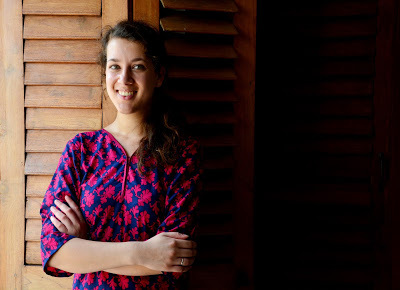
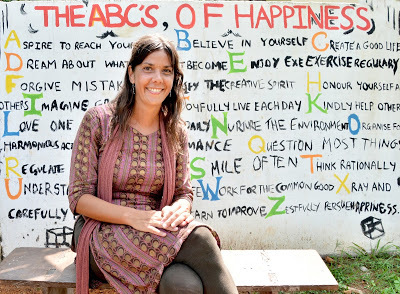 The Netherlands-based clinical psychologist Saisha Partiman, of Indian and Nepali origin, talks about her experiences in counselling children in Kerala
The Netherlands-based clinical psychologist Saisha Partiman, of Indian and Nepali origin, talks about her experiences in counselling children in KeralaPhotos: Saisha Partiman and Olga Martin; images by Ratheesh Sundaram
By Shevlin Sebastian
In February, last year, the Netherlands-based Saisha Partiman was in a hotel at Chiang Mai, Thailand where she met a young man at the reception lounge. Saisha and he got talking about travelling and what they were doing with their lives. Saisha told him about her desire to do volunteer work as a psychologist in India. Suddenly, the man said, “If you want to do that, get in touch with 'Street Heroes of India' [a (Kochi) Kerala and Karnataka-based NGO].”
Thereafter, the man gave an e-mail contact. So, Saisha sent a mail to Olga Martin, one of the founders. The latter replied, “I am very interested in your background as a clinical psychologist, and that you do art and music therapy. We would love to have a collaboration.”
Saisha came to Kochi in January and has been working with traumatised children, from the ages of six to 20.
What has shocked Saisha is the widespread physical, emotional and sexual abuse of girls and boys, especially by members of the family. “There is a lot of incest, too,” she says.
The psychological impact on children is deep and long-lasting. “Many have a disturbed attitude towards sexuality and relationships,” says Saisha. “They feel that nobody can be trusted. They also suffer from low self-esteem, distress, anxiety and depression.”
What has surprised Saisha is the taboo in Kerala society to talk about abuse, especially sexual molestation. “The reasons for the silence seems to be a sense of shame and a desire to protect the family's reputation,” says Saisha. “I am also told parents don’t want to damage the wedding prospects of their daughters.”
But this silence is not healthy. “If a child cannot express sadness, anger and fear, it will burst out in the form of violence, anger or even suicide,” says Saisha. “And it also allows the perpetrators to escape punishment.”
So Saisha had encouraged the children to express their feelings through art. “They did drawings on paper using crayons,” she says. “Some drew traumatic scenes, like being beaten up, but, in the end, the children felt much better and became positive-minded.”
Meanwhile, when asked about the difference between therapy in Kerala and the Netherlands, Saisha says, “In the Netherlands, we have more means, money, and staff. In Kerala, there is very little means for the staff. So they hope for an instant cure. But it takes years of therapy before a person is healed.”
Nevertheless, she is happy to be in Kerala. “I feel I have returned to my roots,” says Saisha. “I recognise a spirituality that is there in my family.”
Her Indian and Nepali-origin father, Tansingh, grew up in Suriname and then migrated to the Netherlands as a boy. Later, after his studies, he married a Dutch woman, who is Saisha's mother. “I grew up in a multi-cultural environment, with a lot of Indian influences,” says Saisha. “So I feel that I am 60 per cent Dutch and 40 per cent Indian.”
And it was her father's voluntary work in India that inspired her to become a psychologist. “From a very young age, I had a desire to help traumatised children, especially in India,” she says. “I don't know how that urge arose, but it could be a mix of my father's work and my Indian roots.”
Saisha will be returning to Holland soon, but has plans to carry on working in India, as and when she gets the chance.
Kerala Police statistics for 2015
Rape of children: 711
Other crimes: 1406
Grim Ratio
Olga Martin, founder of 'Street Heroes of India' [a Kerala and Karnataka-based NGO], says, "A recent UNICEF report provided an alarming figure that 39 per cent of girls and 40 per cent of boys in Kerala have been sexually abused. This is usually done by family members, like fathers, uncles and other relatives,” says Martin.
She feels that there is an urgent need for sex education in schools. “Children should be taught to identify between a good and a bad touch,” she says.
(The New Indian Express, Kochi and Thiruvananthapuram)
Published on April 22, 2016 23:32
April 20, 2016
The Danger of Fireworks And a Risky Jeep Ride
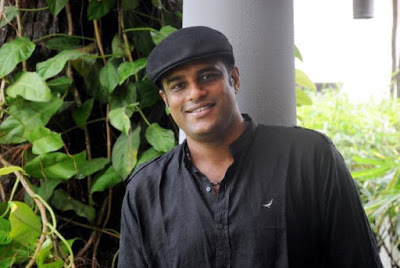
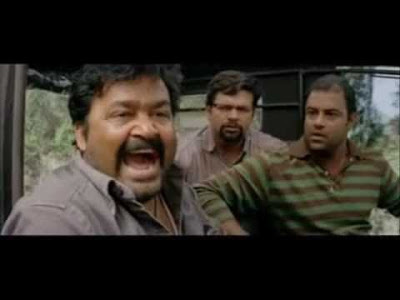 COLUMN: LOCATION DIARY
COLUMN: LOCATION DIARYWriter/Actor Murali Gopy remembers his experiences in the films, 'Rasikan', 'Bhramaram' and the upcoming 'Pava'
Photos: Murali Gopy; a scene from 'Bhramaram'
By Shevlin Sebastian
One day, in 2004, writer/actor Murali Gopy, wearing a blue shirt and lungi, and sockless black shoes, stood at an open ground in Kaloor, Kochi. Just three feet away from him, there was a long line of fireworks (kadana). In the film, 'Rasikan', Murali was playing a goonda, by the name of Kaala Bhaskaran, who had killed a policeman. As he started walking, the firecrackers were lit.
And it began bursting, one by one, letting out thick plumes of smoke. Suddenly, one firecracker turned direction and headed straight at Murali. At the last moment, he managed to move away. “It missed me by centimetres,” he says. “I shudder to think what would have happened if it had hit me.”Nevertheless, since he was walking so close, he had blisters on his calves and lower legs.
“All these memories came to my mind, when I read about the terrible tragedy, at the Devi temple, at Puttingal, where so many people lost their lives, because of the fireworks display,” he says.
Nevertheless, for an actor, risk-taking is part and parcel of the profession. He remembers some hair-raising moments in the film, 'Bhramaram' (2009), directed by Blessy. While Mohanlal played a person, who had served jail time, because he had been falsely accused of murder, Murali donned the role of a doctor by the name of Alex Varghese.
The shoot took place in the high ranges in Idukki, in April, 2009. In one scene, Mohanlal drives a jeep close to the cliff-edge. “In certain films, you have to take the risk, to have maximum impact on the viewers,” says Murali. “Mohanlal felt that 'Bhramaram' was a film like that.”
While Murali sat next to him, Suresh Menon, who plays the third character, remained at the back. “Mohanlal clearly took a risk by driving so near the edge,” says Murali. “Had he made a slight error, we would have fallen off.”
Thanks to Mohanlal's professionalism and calm under pressure, he drove the jeep without any mishap. “I admired Mohanlal's sense of timing, as well as his dedication,” says Murali. “Not many superstars would have taken the risk. They would have taken the easy option of asking for a stunt double.”
Meanwhile, Murali has pleasant memories of the shoot for 'Pava', the short form for 'Paappanekkurichum Varkeyekkurichum', which is expected to be released on May 27. Murali is playing Devassy Paappan, an 80-year-old Christian patriarch, while Anoop Menon is doing the role of Varkeyekkurichum. But, in an interesting twist, Paappan's younger sister is being played by the veteran KPAC Lalitha.
Lalitha had played the lead, with Murali's father, the legendary Bharat Gopy, in 'Kodiyettam' (1978), while in 'Ormakkayi' (1982), she acted as the sister to Gopy. “Lalitha Aunty would always tell me on-set anecdotes about my father,” says Murali. “She has so much to share about the old days.”
So, it came as no surprise that Murali had a great feeling, when he had to act, as her older brother, during the shoot, at Bharananganam, in December, last year.
During their first shot together, Lalitha, who is wearing a chatta and mundu, delivers her line: “Paappa, don't cry.” Paappan then mumbles an indecipherable reply. After the shot had been canned, they smiled sweetly at each other, knowing that it had been a special experience.
(The New Indian Express, Kochi, Thiruvananthapuram and Kozhikode)
Published on April 20, 2016 01:03
April 19, 2016
Giving The English Version
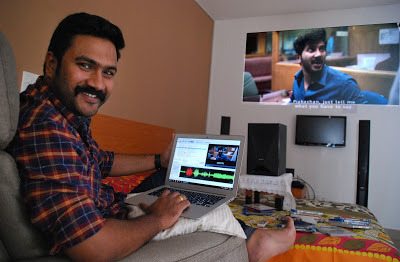 Vivek Ranjit has been doing the English sub-titling of most of the recent Mollywood hits like 'Charlie', 'Action Hero Biju' and 'Kali'. He talks about his experiences
Vivek Ranjit has been doing the English sub-titling of most of the recent Mollywood hits like 'Charlie', 'Action Hero Biju' and 'Kali'. He talks about his experiences Photo by K. Shijith
By Shevlin Sebastian
On April 7, Vivek Ranjit wrote on his Facebook wall: ‘From tomorrow, a beautiful family drama, ‘Jacobinte Swargarajyam’ (Jacob's Kingdom of Heaven), will be releasing. May this adorable Kingdom of Heaven be the winner of this season. So glad I could also be a small part of it by subtitling it’.
A day later, there was a response from Abhishek Sreekumar, a Chennai-based content writer: 'You are doing a fab job. People know you by name. You are uplifting the quality of meaningful cinema. Keep up the good work.'
Last month, Mollywood star Dulquer Salman wrote on his Twitter feed: 'So glad you are a part of our films and improving our reach'.
The Kochi-based Vivek is developing a reputation of being a good sub-titler. All the recent movies that he has done, like 'Charlie', 'Action Hero Biju', and 'Kali' have done well outside Kerala. “In fact, Dulquer [‘Charlie’] and Nivin Pauly [‘Action Hero’] have a huge fan following in places like Chennai, Hyderabad and Mumbai,” says Vivek. “There is a big demand among young non-Malayalis to see Malayalam films. I believe one of the reasons is the sub-titling.”
Earlier, Vivek had to force his Chennai friends to watch DVDs of Malayalam movies. Now they are all going to the theatre.
Usually, Vivek gets the film a month before the release. He views it in a home theatre, and starts sub-titling it. “It is not always a literal translation,” says Vivek. “I aim to be simple and clear. With minimum words, you have to communicate the maximum. The viewer usually sees the image, then reads the dialogue, and waits for the reply from the other character. So there is little time.”
Normally, people take about one-and-a-half seconds to read a dialogue, and about three seconds if it a longer one. If it is a speech, the sentences will spill over to the next frame.
Following the completion of his work, he sends it by mail to the film's editor, who will then upload it, along with the video and sound file, on a digital platform like Qube. Cinema owners then download it, using a given user name and password, to their respective theatres.
Vivek is happy that Mollywood is changing its attitude towards sub-titling. “Earlier, people never took it seriously,” he says. “But now they feel that they can expand their market and make good money.”
Dulquer, in another tweet, aimed at Vivek, wrote, 'Love that subtitling is becoming popular in our films. I have always dreamed of this and releasing our films nation-wide. Rock on.'
Meanwhile, Vivek has another dream. He wants to sub-title the classics. “Again, this will make it attractive to non-Malayalis, who have no idea of our rich tradition of making beautiful films,” he says. With this end in mind, Vivek has approached a few television channels to offer his services. Most of them have a platform on You Tube where they screen old movies.
As for his future plans, Vivek, who was part of a three-member team that had written the script for the 2013 Malayalam movie, ‘Kili Poyi’, wants to become a director one day. “I am learning from my interactions with writers and film-makers,” says Vivek, who is busy doing the sub-titles of veteran director Ranjith's much-awaited, 'Leela'.
(Sunday Magazine, The New Indian Express, South India and Delhi)
Published on April 19, 2016 06:00
April 17, 2016
Making Beauty Out of Decay
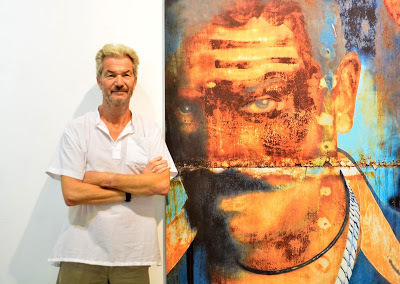
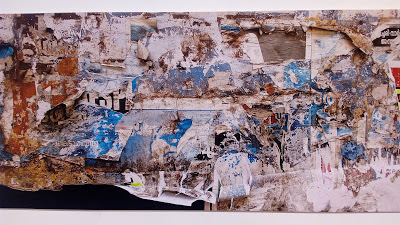 French photographer Louimari Maudet focuses on the decayed posters that can be found all over India
French photographer Louimari Maudet focuses on the decayed posters that can be found all over IndiaPhoto of Louimari Maudet by Ratheesh Sundaram
By Shevlin Sebastian
Jean Gauthier, 30, a teacher from Brussels, walks around the OED Gallery at Mattancherry, near Kochi, with widened eyes. “This is a most unusual exhibition,” he says.
Indeed, it is. French photographer Louimari Maudet's show, 'Ca Vous Regarde' (What are you looking at), is about decayed, torn and mutilated posters, which can be seen all over India. “These are things we see, but we ignore,” says Gauthier. His friend, Kim Mertens, a translator, says, “The posters look transformed. On the road, it looks ugly, but, now, it is a thing of beauty.”
Many have been ripped off. So, you can only see an eye or a nose. Sometimes, other posters have been placed on top of one. Not surprisingly, there are many cinema posters. In one, you can see the left eye of Amitabh Bachchan and, in another, there is the face of Kamal Haasan, from the Tamil film, 'Virumandi', with unblinking eyes and a black moustache. The white sandalpaste on the forehead, has turned brown and so has the black hair.
“These posters suffer from the effects of the rain, wind, sun, human intervention, insects, dust, and smoke from small fires,” says Maudet. “And they are pasted everywhere: not only on walls, but also on lamp-posts, doors, fences, and abandoned old cars.”
Altogether 26 posters are on display, although he has taken more than 4000 photos. “These digital images have been transferred to canvas through a pigment print process,” he says. “Their hidden beauty is revealed in this way.”
Like most passions in life, Maudet stumbled on to it by accident. One day, in 2009, he was photographing a watchmaker in Chennai. Right next to the shop, he noticed an old poster on a wall. “The poster seemed to be looking at me,” he says. “I finally took a photo.”
The same day, while Maudet was walking around, he suddenly noticed that many posters had the same powerful look. “I began taking pictures,” he says. “Soon, it became an obsession.” Thus far, he has taken photos in places like Srinagar, Kanyakumari, Mumbai, Chennai, Jaïpur, Kolkata, Bengaluru, Thiruvananthapuram, Madurai, Pondicherry, Mysore and Hyderabad. Over a ten-year period, he has gone to 60 cities.
Maudet follows a particular method of work. “When I am in a city, I select a location and walk down the street,” he says. “Then I come back from the opposite side, all the time looking for old posters. Thereafter, I go down parallel and perpendicular roads. I end up walking about 25 kms. But, at the end, I would have selected the posters I want to click.”
Asked whether ordinary people notice these posters, he replies in the negative. “The impact of the posters diminishes over time,” he says. “But when people see me take pictures, they ask me what I am doing. My answer makes them have a re-look at the posters. And we end up having extraordinary conversations.”
One day, in Chennai, while he was shooting, three men arrived with new posters, as well as a pot of glue. They were going to paste them over the old ones. “I told them, 'Please don't destroy these beautiful posters which I want to photograph',” he says. “They were kind enough to give me the time. But, later, they came and did their job.”
These decayed posters are also a metaphor for life. “We win fame, awards and honours,” says Maudet. “But, later, we suffer from decay, and, ultimately, death. I often ask myself: 'What has happened to the person in the photo? Is he alive? What did he become? What would he want to tell us if we met him today?' These posters are short-lived, just like our life on earth.”
(Sunday Magazine, The New Indian Express, South India and Delhi)
Published on April 17, 2016 22:13
April 15, 2016
Magic At The Fingertips
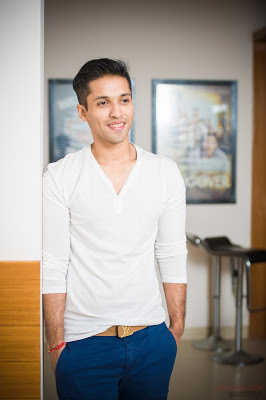
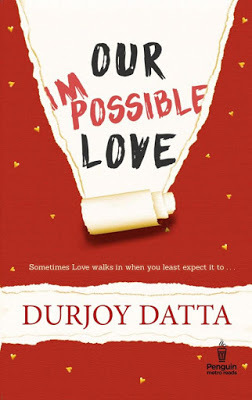 Durjoy Datta has just released his 12th novel, 'Our Impossible Love'. The best-selling author of commercial fiction, with sales touching 20 lakh, talks about his career
Durjoy Datta has just released his 12th novel, 'Our Impossible Love'. The best-selling author of commercial fiction, with sales touching 20 lakh, talks about his careerBy Shevlin Sebastian
In July, last year, author Durjoy Dutta, 29, was at a reading session at a New Delhi bookstore. After the reading, two girls came up to him. One of them, Natasha, 19, (name changed) showed a tattoo on her arm. It was a sentence from his novel, 'World's Best Boyfriend': 'Love is a conscious decision to be destroyed'. The other girl had it in her lower back, so Durjoy could not see it.
“I felt unnerved,” says Durjoy. “These were permanent tattoos. I suddenly thought, 'What if they stop liking my books tomorrow? Or start hating me? Will they regret the tattoos?'”
Durjoy received the same rapturous reception at Kochi during a recent reading of his just-released 12th novel, 'Our Impossible Love'. The girls cooed, gushed and giggled. One said, “We waited such a long time to see you. Please come more often.” Two girls came near Durjoy said, “Can we take a selfie with you, so that we can put it in the school magazine?”
Durjoy is one of the hottest young writers in commercial fiction in India today. His latest novel has a first print run of one lakh copies. “The theme is about a girl, Aisha Paul, who turns 18,” says Durjoy. “She wants to emulate her mother, but the latter commits suicide. Then the girl thinks, 'My mother is not the person I thought she was. I must be my own person.' The novel tells the story of her journey of finding out what it is to be a woman.”
Thus far, his oeuvre has sold a total of 20 lakh copies. Asked the reasons for his popularity, Durjoy says, “Readers can relate to the characters. They are usually taken from real life. And the problems they face are common to all.”
Some of the subjects include young people in college, who are struggling with their relationship issues, family, and jobs. “But, in all the novels, at the core, there is a love story,” he says.
A mechanical engineer, as well as a MBA graduate, Durjoy became a full-time writer in 2011. “It is a difficult career because of the uncertainty and pressure,” he says. “It is not necessary that all the books I write will sell well. Indian commercial fiction does not have a long history. In the West, if you have two best-sellers, you make millions, and be set for life. James Patterson, [who has 114 best-sellers] can buy a country.”
Interestingly, in India, there are very few best-selling authors in commercial fiction. “Since 2008, there are only eight of us,” says Durjoy. “I believe there is talent out there, but we need to discover them. And the onus is on writers, literary agents and publishers.”
And book-sellers, too. “The shelves in book stores for Indian commercial fiction remain the same,” says Durjoy. “Store owners rarely put new authors there. On the other hand, Western commercial fiction space will never be compromised. Nora Roberts and Stephen King will always get two shelves. So Indian publishers get discouraged. That's the reason why they don't put in that much of effort for a new writer. As a result, authors feel dissatisfied. It is a vicious circle.”
A further discouragement is the critical attitude of book reviewers towards commercial fiction. “I know they did not like three things in the book but liked ten other things,” says Durjoy. “So you should talk about that. In the West, they like a book easily and and talk enthusiastically about it. This helps a book to do well in the market.”
(The New Indian Express, Kochi, Thiruvanthapuram and Kozhikode)
Published on April 15, 2016 22:31
April 13, 2016
Riding A Bike Inside A Dome
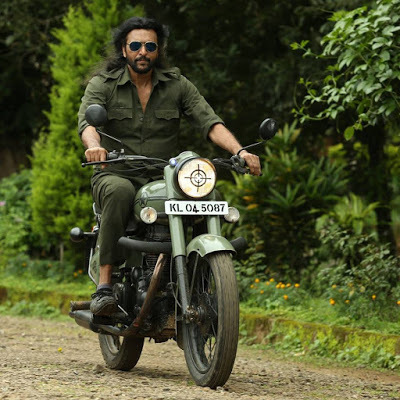 COLUMN: LOCATION DIARY
COLUMN: LOCATION DIARY Actor Babu Antony talks about his experiences in 'Carnival' and his first Bollywood role
By Shevlin Sebastian
Actor Babu Antony was in a dilemma. He had always done his own stunts, but in the film, 'Carnival' (1989), directed by PG Viswambharan, there was a scene where he had to ride a motorcycle inside a dome. “The professional riders told me that it took six months of practice before one could do it,” says Babu. Anyway, Babu watched the riders and noticed how they balanced their body, as well as the bike, against the gravitational pull.
But the bike made Babu uneasy. “It had one gear and no brakes,” says Babu. “If you pressed the brake, accidentally, you could fall and injure yourself. That was why the brakes had been removed. It was an old 350cc Army bike, but very light, as compared to a Bullet.”
Soon, Babu got ready. He could not wear a helmet, since he needed to show his face to the camera. But, all at once, the weather changed. “There were thick black clouds,” says Babu. “4 p.m. became like 7 p.m.. The crew said it was a bad omen.” Meanwhile, there was only one camera placed at the top. The crew members refused to put a camera on the floor, in case Babu lost control and the bike fell on it.
Babu started the bike, and began going round and round at a lower level. Then, gradually, he picked up speed and moved higher. He did a few rounds, but, suddenly he became blind. “I could not see where I was going,” he says. “I was told later that this happens to all riders and fighter pilots. That is how major accidents happen when you do adventure sports.”
Panic-stricken, Babu pushed the bike downwards. Somewhere, close to the bottom, he jumped off. “I landed on my haunches, placed my hands over my head, in case the bike fell on top of me,” says Babu. “But luckily, it did not.”
However, when he asked Viswambharan, the director said that the shot was not okay. “He asked me whether I could do it again.” So Babu agreed. In the end, Babu did the ride eight times. “Each time I rode for two to three minutes,” he says.
When the shooting got over, immediately, it started raining. And it continued till the next morning. “I still get goosebumps when I think about how the rain held off,” says Babu. “But, on the screen, there was not much of an effect, because only one camera was used. So, that was disappointing.”
But there were uplifting moments, too. His role as Renji, a villain, in 'Poovinu Puthiya Poonthennal' (1986) received widespread praise. Subsequently, he acted in the Tamil, Kannada and Telugu versions. During a break in shooting for the Telugu film at Chennai, Babu had gone to Pune. On his return, he was held up at the check-in counter at Mumbai airport, where there was some problems with his ticket. A man came rushing towards him and said, “Are you Babu Antony?”
Babu nodded. He said, “I am [Bollywood hero] Govinda's brother, Kirti Kumar.” Babu looked skeptical. So Kirti said, “Come with me.” At another part of the airport, Babu was introduced to Govinda, Rekha, and Anupam Kher. Govinda hugged Babu, and said, “Bob, what a wonderful role you did. You were excellent.”
Following immediate financial negotiations with Kirti, Babu got his first Hindi role in 'Hatya' (2004). “When I look back, if there had been no problems regarding my ticket [which were later resolved], I might not have got this chance,” says Babu.
(The New Indian Express, Kochi, Thiruvananthapuram and Kozhikode)
Published on April 13, 2016 02:11



